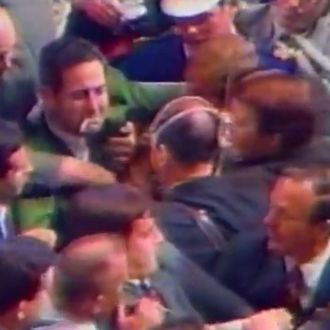
For political junkies, there is no better flight of fancy in a fractious presidential year than to dream of a “brokered” — or more accurately, since there are few “brokers” left in American politics, a “contested” — national political convention, of the sort that seems possible for Republicans this time around. You don’t have to imagine dark-horse candidates emerging on the 103rd ballot (as happened to Democrats in 1924) to understand that a convention without a sure nominee would not only be anomalous (the 1976 Republican convention was the last with any real doubt about the identity of the nominee), but would also be a logistical nightmare.
The main reason political conventions have become such tediously predictable displays — essentially extended ads for the party’s chosen message and ticket — is that they are planned in every significant detail by the nominee and her or his staff. The execution is up to the national committee — or more specifically, a quadrennial army of professionals and volunteers, many of them veterans of prior conventions — but without an iota of autonomy. Unless someone can climb in a time machine and bring back a tyrannical party chair and a cabal of state bosses to impose order, it’s unlikely to exist.
So not having a nominee would effectively decapitate the whole enterprise, and make a million details subject to pitched fights involving the remaining candidates. Interest groups, donors, ideological factions, and entrepreneurial jive-asses can be expected to fill the power vacuum by seizing key items of turf like prime-time speaking slots and even hotel or event space. Worse yet, the very rules that will help Republicans resolve the nomination will be up for grabs in Cleveland, as RealClearPolitics’ Emily Goodin reports:
The most important time during the Republican Convention could be the week leading up to the convention.
That is when GOP delegates and Republican National Committee members will gather to work out the rules governing the four-day gathering this summer.
They are numerous and convoluted, which is causing confusion among the ranks but giving an added incentive to lower-tier presidential candidates to stay in the race long enough to bank a bloc of delegates to put into play in Cleveland.
That confusion was on display during the RNC’s Winter Meeting here when the Standing Committee on Rules met Thursday. The meeting stopped at three different points for the parliamentarian and committee members to debate the rules behind changing the rules.
The rule everyone’s focused on is one adopted in 2012 to keep Ron Paul delegates invisible, but now could keep viable candidates — or any candidate at all — from having his or her name placed in nomination without control of at least eight state delegations. For this crucial issue to be resolved so long as multiple candidates are in contention is extremely difficult — so it is being put off until the Convention Rules Committee meeting in Cleveland, when it is hoped a putative nominee will despotically decide it.
A slick, heavily produced party convention is, of course, not essential to democracy, and some would say it is inimical. But one has to wonder if the Republicans — or either party, for that matter — are ready for anything else, and can get through the chaos and menace of an old-style deliberative convention without a collective nervous breakdown. The fact that any scenario for a contested convention will likely include Donald Trump just adds to the fearful spectacle.
And so as July approaches, the orphan army of party hacks and host committee folk who await orders on the convention will begin to look like cargo cultists, scanning the skies for deliverance and a confirmation of their faith. Without a boss, they could soon begin to kick their traces and run wild.
It’s hard to imagine things getting as bad in Cleveland as, say, they did in Chicago in 1968 when Democrats witnessed a “police riot” against protesters, reporters being dragged off the floor, and the host-city mayor mouthing obscenities on national TV at a speaker who displeased him. But there’s a nasty mood among Republicans this year, and it would be dangerous to tempt them to show their teeth.






























